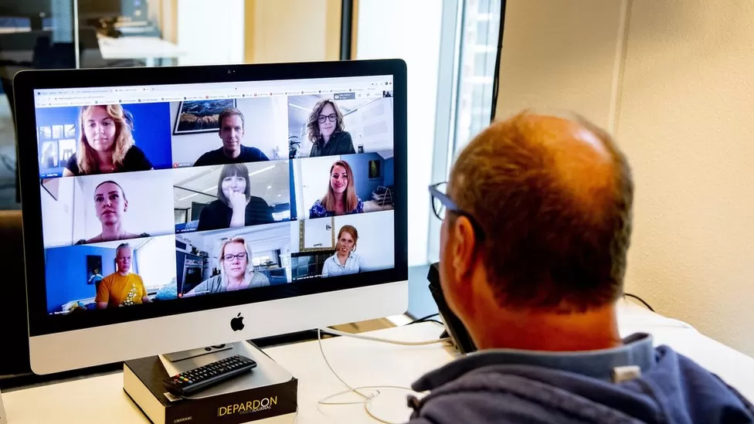Zoom, the video communications company whose name became synonymous with remote work during the pandemic, has ordered staff back to the office.
The firm said it believed a "structured hybrid approach" was most effective and people living within 50 miles (80km) of an office should work in person at least twice a week.
It is the latest push by a major firm to row back flexible working policies.
Amazon and Disney are among the firms that have reduced remote work days.
Surveys suggest that workers are still holding onto the ability to work from home to some degree.
About 12% of workers in the US, where Zoom is headquartered, were fully remote in July, while another 29% had hybrid policies, according to a survey by researchers at Stanford University and others that has been conducted monthly since before the pandemic.
That is similar to patterns recorded by the Office for National Statistics in the UK earlier this year.
Earlier research by the Stanford team has found remote work is more common in English-speaking countries, and far less common in Asia and Europe.

Before the pandemic, the share of days worked from home in the US was only about 5%. Globally, workers consistently desire more flexible working arrangements than employers see as optimal.
Zoom said it would continue to "hire the best talent, regardless of location". At the end of last year, the company employed about 8,400 people, more than half of whom are based in the US.
About 200 people work for Zoom in the UK, where it just opened a new London office.
The firm said that the new policy would put the company in a "better position to use our own technologies, continue to innovate, and support our global customers".
"We'll continue to leverage the entire Zoom platform to keep our employees and dispersed teams connected and working efficiently," Zoom said.
The expansion of remote work has prompted Zoom rivals, such as Microsoft, to upgrade their video offerings, putting pressure on Zoom, despite its early lead in the space.
Its share price has dropped sharply since its peak in October 2020.
Its shares are worth about $68 apiece today, down from more than $500.
Latest Stories
-
BoG statement on OTC withdrawals was timely – Ghana Association of Banks
21 minutes -
Fuel prices to witness biggest drop of 8% today, May 16 due to cedi’s appreciation
42 minutes -
PUWU urges government to renegotiate IPP contracts to curb revenue losses
44 minutes -
GITA, NUSPAW sign pact to improve working conditions of seafarers
44 minutes -
Africa-CDC Director-General lauds Mahama’s leadership in healthcare delivery
44 minutes -
Second Ghana Automotive Summit 2025 launched in Accra to promote locally assembled vehicles
1 hour -
FirstBank collaborates with Rotary Club to commission Berekuso Community Clinic
2 hours -
Needless Immigration and Police Checkpoints crippling the Volta Region
2 hours -
Forestry Commission engages industry players ahead of timber licensing regime
2 hours -
Constitutional Review Committee engages journalists, social media community
2 hours -
‘We’ve already hit IMF target’ – BoG Deputy Governor declares reserve milestone
3 hours -
‘We’re not burning reserves to hold the cedi’ – BoG Deputy Governor tells Joy News
3 hours -
Cedi stability backed by organic, non-debt creating reserves – BoG First Deputy Governor
4 hours -
‘I didn’t come here for fun’ – Afrikaner defends refugee status in US
4 hours -
Leading crypto firm Coinbase faces up to $400m hit from cyber attack
4 hours

